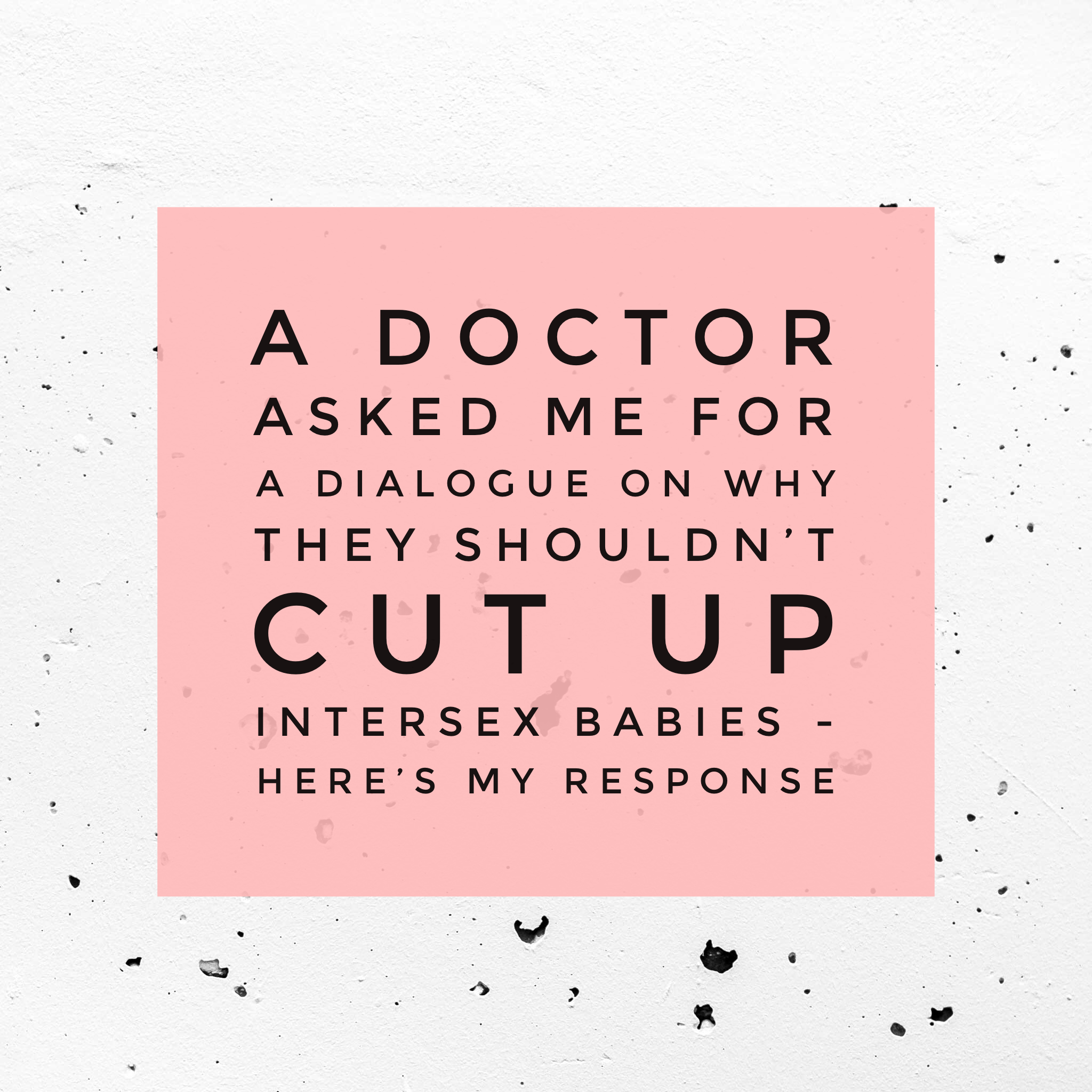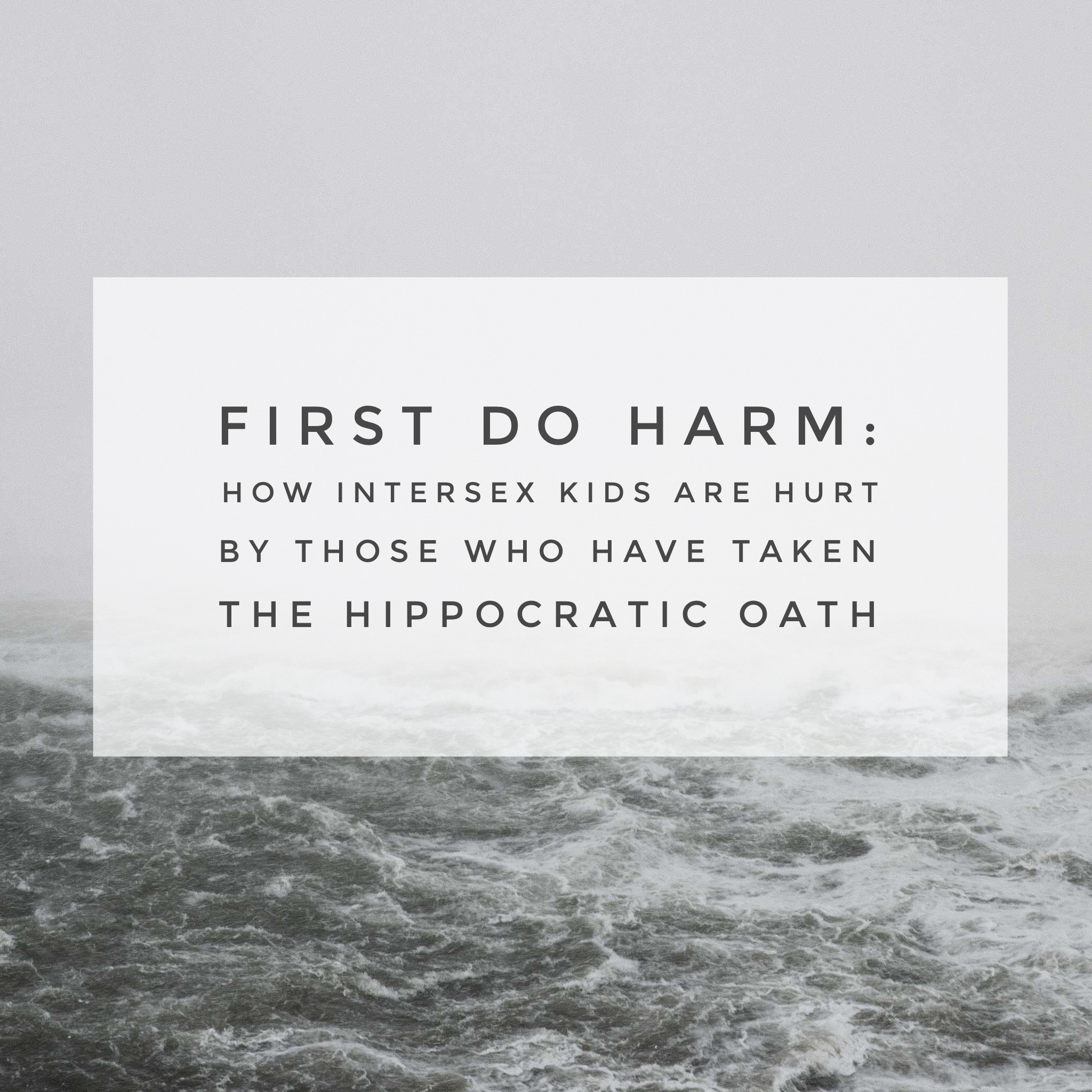A Doctor Asked Me for a Dialogue on Why They Shouldn’t Cut Up Intersex Babies - Here’s My Response
Traducción de Brujula Intersexual: Un doctor me pidió conversar acerca de por qué no deberían cortar a los bebés intersexuales – Aquí está mi respuesta. Por Pidgeon Pagonis http://bit.ly/2yGHh3i
On October 5th, the Washington Post published this amazing long-form article on the intersex movement--featuring a number of my dear friends and fellow activists. It’s not often that a major publication dedicates 6,000 words of thoughtful, nuanced journalism to our community.
The piece featured intersex people talking about our painstaking work to end a decades-old and thoroughly debunked medical paradigm that says our bodies are so wrong that doctors should be able to surgically alter us however they want--without our consent and when we are too young to participate in the decision. This is what happened to me at Lurie Children’s (formerly Children’s Memorial) in Chicago; I was operated on three times as a kid, for no medical reason, and without my knowledge or consent. I’ve been living with the fall-out ever since. It was mutilation. And I’m not alone in my conviction--three former US surgeons general came out against the practice, as have the Board of Trustees of the American Medical Association, the United Nations, the World Health Organization...and the list goes on…
The Washington Post article reflected our ongoing struggle to end this medically unnecessary genital surgery on intersex kids. No one should operate on us without our consent, let alone perform procedures that have been universally condemned by our community and international human rights bodies. But not all doctors agree: the reporter interviewed a handful who defend non-consensual “cosmetic” surgeries on intersex infants. And there are even more out there--like this guy at Cornell who not only performs clitorectomies on intersex children, but tests out his technique by putting vibrators on what’s left of their clitorises afterward.
After I tweeted affirmations to my beautiful intersex friends featured in the article, I saw the University of Michigan children’s hospital was tweeting about it too. They tweeted how proud they were of their faculty investigator, Dr. David Sandberg, for discussing “the difficulty of treating intersex patients.”
Our bodies might be a little more complicated than most, but we aren’t any more “difficult to treat”--start with dignity, respect, informed consent, and take it from there.
But Sandberg and his friends are completely illogical. For over 20 years they’ve hidden behind the “need for more data” excuse, and yet they continue to promote and do surgeries while failing to produce said data. Since when does medicine need data to STOP doing super invasive and medically unnecessary surgery on people? Even Human Rights Watch called Sandberg out, saying “as if the dearth of reliable data on precisely how many kids have suffered harm because of these surgeries was a reason to keep doing them.”
It’s 2017 and I can’t believe we are still fighting this battle. Pediatricians should be looking out for kids, not dismissing them like data points. Imagine if my doctors had actually thought of me like the healthy little kid that I was rather than a nail that needed to be hammered back into the gender binary?
So, I tweeted at University of Michigan and called Sandberg out.
It turns out he’s not on Twitter, but his friends are, and he emailed me asking for a dialogue.
Since intersex activists--starting back when Bo Laurent first spoke her truth and launched the Intersex Society of North America 25 years ago--have been in polite, private dialogue with doctors for so long, I thought: Sure, let’s have a chat Dr. Sandberg, but let’s do it in public. Let’s show everyone where we’re at.
Here’s my open letter to Dr. David Sandberg. Since he received taxpayer money for his research and works at a state university, we all deserve to know what brought him to tell the Washington Post he should be allowed to keep promoting a First Do Harm model of care for intersex kids.
----
Dear Dr. Sandberg:
Thank you for your email dated October 5th requesting a discussion about your quotes in the recent Washington Post article and your approach to care. Here are my questions. I kindly request a response by October 26th, which, as you might know, is Intersex Awareness Day.
- You state that you believe it would be “hubris” to advise a parent to delay surgery on their intersex child—to imply that a doctor knows better than a parent what the child’s best interests are. How would you respond to a parent who came in asking for sterilization or female genital mutilation to be performed on their young child? For a cosmetic rhinoplasty? For a healthy limb to be removed?
- You emphasize the lack of data on intersex children who grow up without medically unnecessary surgical procedures. That appears to be an inversion in basic medical ethics. What do you believe is different about treating intersex children that justifies procedures for which there are no affirmative data showing the results are bneficial?
- Speaking of data, can you describe the study that you would personally consider sufficient to support a shift in care so that all medically unnecessary, non-consensual surgeries on intersex children are delayed? Is such a study feasible and likely to ever be performed, or is the lack of data going to persist indefinitely as an airtight excuse to continue performing surgery?
- As a psychologist, you are familiar with the kinds of distress associated with gender dysphoria. Surgery also carries risks. So then, what is an acceptable level of risk a doctor should take when he is conducting a medically unnecessary surgery that could create a body different from that individual’s gender identity when they grow up?
- And finally, when the MC case was settled in South Carolina – in which adoptive parents sued the state for genital surgery the government had elected to do on him when he was a baby that conflicted with his later gender identity—you told Buzzfeed that “The plural of anecdote is not data” --as a way of saying you didn’t think horrific outcomes like MC’s, mine, and so many others were reason enough to change. What, then, are doctors who pledge to “do no harm” waiting for? How many more people need to suffer before you and your peers will support changing this paradigm?
- Can you think a bit about how you would feel if that had been done to you.
Sincerely.
Pidgeon Pagonis
They/Them/Theirs
Chicago






